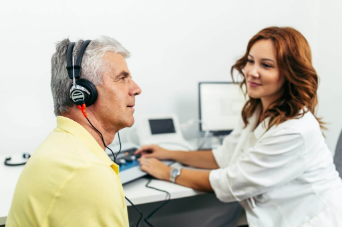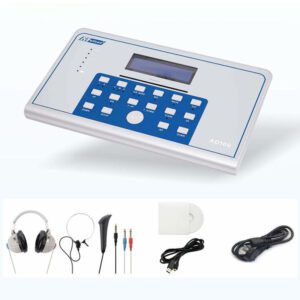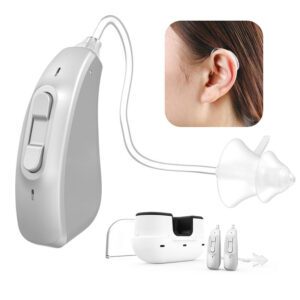hearing Loss can develop gradually and often goes unnoticed until it starts to interfere with daily life. If you’re wondering, “Do I have hearing loss?”, you’re not alone. Millions of people worldwide experience some degree of hearing difficulty, but the signs are often subtle at first. To help you assess your hearing health, we’ve put together a self-assessment quiz, along with a variety of tools—ranging from online tests to professional hearing instruments like the audiometer—used in clinical hearing evaluations.

Self-Assessment Quiz: Do I Have Hearing Loss?
Answer the following questions honestly. Give yourself 1 point for each “Yes” answer:
Do you often ask people to repeat themselves?
Do you find it hard to follow conversations in noisy places like restaurants?
Do you feel like people are mumbling, even when they’re speaking clearly?
Do you frequently turn up the TV or radio louder than others prefer?
Do you struggle to hear on the phone, especially in quiet environments?
Do others complain that you speak too loudly?
Do you avoid social events because it’s hard to keep up with conversations?
Do you experience ringing, buzzing, or hissing sounds in your ears (tinnitus)?
Do you find group discussions particularly challenging?
Do you feel exhausted after trying to listen for long periods?
Score Interpretation:
0–2 points: Your hearing seems normal. No major concerns.
3–5 points: Mild signs of hearing loss. You may want to schedule a hearing Test.
6 or more points: Strong indication of hearing impairment. A professional evaluation is highly recommended.
Online Hearing Tests: First Step Tools
Several websites and mobile apps offer free hearing screenings using headphones. While these don’t replace clinical tests, they can help identify if professional testing is needed.
Recommended Platforms:
ReSound Online Hearing Test – Offers tone and speech-in-noise testing.
Phonak Hearing Screener – Interactive hearing check with immediate feedback.
Mimi Hearing Test (App) – Calibrates to your headphones to map your hearing profile.
Widex Hearing Check – Helps detect frequency-specific hearing loss.
These tools test your ability to hear tones at different volumes and frequencies, and your ability to understand speech in noisy environments. They’re easy to use and can be done in private, at your convenience.
Physical Symptoms to Watch For
In addition to quizzes and digital tools, your body might give subtle clues that your hearing is changing:
Difficulty understanding consonants like “s,” “f,” and “th”
Needing to turn your head toward a speaker to hear better
Avoiding phone calls or social settings
Feeling isolated or mentally fatigued after conversations
Being overly sensitive to loud sounds (hyperacusis)
These signs could indicate age-related hearing loss (presbycusis), noise-induced damage, or even reversible issues such as earwax buildup or fluid in the middle ear.
Professional Testing with an Audiometer
If your self-assessment suggests hearing loss, the most reliable way to get a clear diagnosis is by visiting a licensed audiologist or ENT specialist who uses a clinical audiometer.
A Portable Diagnostic Audiometer is a medical-grade instrument that measures your hearing threshold across various frequencies and sound levels. Here’s how it helps:
Pure Tone Audiometry: Tests your ability to hear tones at different pitches and volumes using headphones in a soundproof booth.
Bone Conduction Testing: Uses a small device placed behind your ear to measure inner ear sensitivity, helping distinguish between different types of hearing loss.
Speech Audiometry: Evaluates how well you understand spoken words in quiet and noisy environments.
Tympanometry: Checks the flexibility and function of your eardrum and middle ear.
Otoacoustic Emissions (OAE) and Auditory Brainstem Response (ABR): Used for newborns or when further neural testing is required.
These tools are essential in identifying whether you have conductive hearing loss (outer/middle ear), sensorineural hearing loss (inner ear/nerve damage), or a combination of both.


